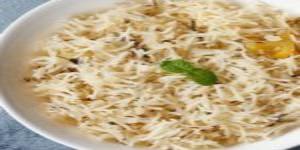
Method
Kushka, is a rice dish made with spices, aromatic rice such as the basmati, or small rice such as jasmine or jeera variety and ghee. A present day Kushka is a lunch dish, primarily served with kurma or korma and very popular in Southern India. The spices and condiments used in it could include cardamom, cinnamon, bay leaves, coriander and mint leaves, apart from ghee, ginger, onions. The dish retains the white color of rice even with the light seasoning of spices.
In the Bhagashastra, the Kushka rice dishes uses simpler and authentic ingredients for aroma. For e.g. a recipe described below uses actual fragrant flowers such as the jasmine in the rice preparation, rather than the flavored rice used in modern day recipes.
Kushka rice dishes have to be cooked in such a way that each grain must be separate and not become a solid mass or mushy. The grains should not stick to the finger. The process, as you will notice from the recipes below, requires patience, as they are long, tedious and need a lot of care in their preparation.
- ½ padi Rice
- 1¼ palam + 1¼ palam Thick Curd
- 1 padi Water
- ? padi + ? padi Milk
- ½ palam Powdered salt
- 2½ palam Ghee
1. Wash and clean the rice nicely. Then drain the water completely.
2. Add the curd to the cleaned rice and mix it. Then again add some water and drain it.
3. Repeat this process with curd and water. This time after adding curd leave it for 1½ hours and then wash with water.
4. Mix the water and milk in a vessel which is rust free and heat it. When it is boiled and reduced to half add the cleaned rice and stir it. Also add the salt to it and close it with a lid.
5. When the rice is half cooked take it out and filter the water using a clean white cloth.
6. Take a vessel which has not become sticky by frequent cooking and cook the rice along with the milk. The rice granules should be cooked to the right consistency (flower like).
7. Lastly add the pure ghee to the rice and mix it evenly. Then keep this rice on a live coal without smoke for sometime and then use it.
Hindu Compliance Body
The Hindu compliance body was established under the executive order of The Supreme Pontiff of Hinduism, dated August 14, 2020, order number 10010, under the title Reviving the Hindu Compliance System and Body
to create, promote, spread and teach the standard procedures for all products and services that are in compliance Hindu Shastras.
Copyright
HCS has the copyright of all its publications. No part of these publications may be reproduced in any form without the prior permission in writing to HCS. This does not preclude the free use, in the course of implementing standard, of necessary details mentioned above. Enquiries related to copyrights to be addressed to KAILASA.
